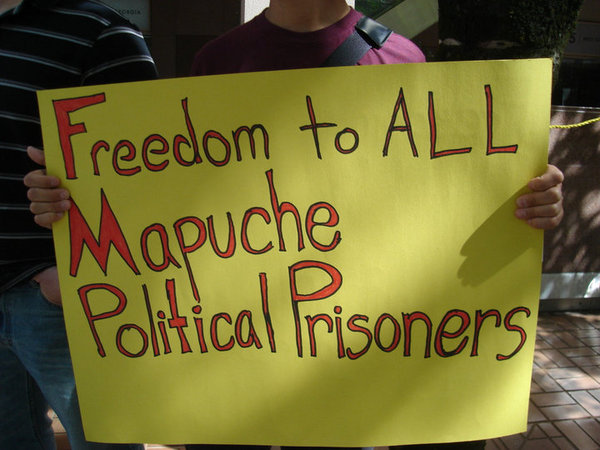When it comes to Canadian foreign policy, business always trumps human rights. This is especially true when it comes to the rights of indigenous people. A clear example of this rule is the Harper government’s non-response to a major protest by the indigenous Mapuche people in Chile, a country with which Canada has a Free Trade Agreement and in which Canada has significant mining interests.
As a hunger strike by over 30 Mapuche political prisoners in Chile reaches a critical stage, international media attention is growing for their demands for an end to the anti-terrorist laws under which they were tried and convicted. These regressive laws remain on the books from the era of the Pinochet dictatorship in Chile, and have been routinely used against leaders of the Mapuche’s struggle to defend their land and autonomy.
The hunger strike began on July 12, and many of the prisoners are now in very precarious health, having lost up to 18 kg.
The Foreign Affairs and International Trade Canada website does not include a word about the Mapuche hunger strike. In contrast, over the past two months the Canadian government has issued five press releases concerning human rights in Iran.
In August, International Trade Minister Peter Van Loan traveled to Chile as part of a Latin American trip. According to his office:
“An aggressive free trade agenda is key to Canada’s strategy in the region. In addition to Colombia, Costa Rica and Chile, the Harper government recently completed free trade agreements with Peru and Panama. Canada also has a number of other free trade-related initiatives under way in the region to bolster economic growth and prosperity.
‘Our government is pursuing an ambitious free trade agenda by concluding and pursuing new free trade agreements with many key partners,’ said the Minister. ‘These agreements help expand trade, encourage economic growth and create jobs. The Americas are a foreign-policy priority for Canada. Canadians have much to gain by being involved in the region, and they also have much to contribute.'”
It’s noteworthy that Canada’s Trade Minister does not even pay lip service to the notion of promoting human rights. In fact, a free trade agreement with Canada would seem to diminish a country’s chances of coming in for official criticism.
There should be no surprise that the Harper government has failed to make any noise in defence of Chile’s Mapuche people and their right to self-determination or to fair treatment in the legal system. Canada was one of just a handful of countries to vote against the UN Declaration on Indigenous Rights and Canada, like Chile, has often deployed military and police violence — and the criminalization of dissent and resistance — against indigenous land defenders.
Activists in Canada have stepped up to draw attention to the hunger strike and to build support for the just demands of the Mapuche. In Vancouver, there have been two solidarity rallies in front of the Chilean Consulate downtown.
Organized by the Mapuche Solidarity Collective, Unceded Coast Salish Territory, these actions have demanded the scrapping of the anti-terrorist legislation, the release of all political prisoners, and reaffirmed “that the Mapuche nation has a legitimate right to fight for the recovery and reconstruction of its ancestral territory, usurped by the Chilean state”. There has been no mainstream media coverage of the Vancouver protests.
If any of the Mapuche hunger strikers die, some of the blood will be on the hands of the Canadian government. Silence is compliance, and Harper and company are only too eager to comply with efforts to shut down indigenous struggles.
Learn more about the Mapuche hunger strikers and their demands here, and look for upcoming solidarity actions near you in the coming days and weeks.




